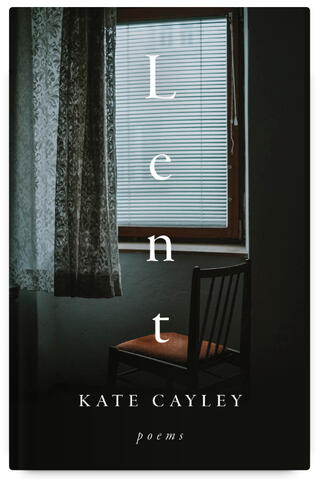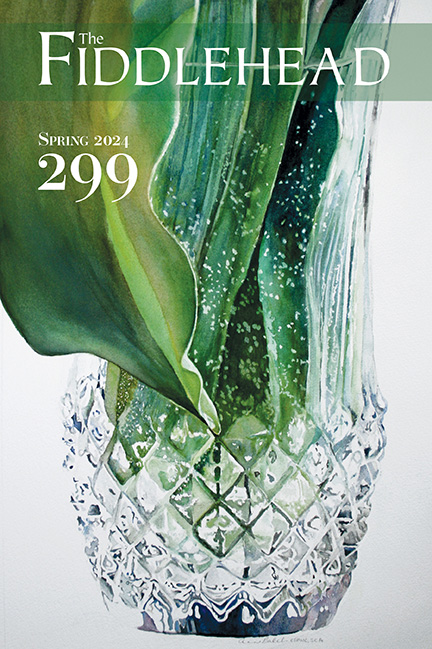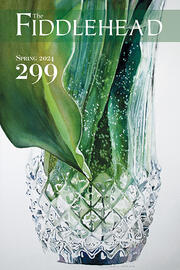
Cautious Praise by Lynn Davies
Lent, Kate Cayley, Book*hug Press, 2023.
In Lent, Kate Cayley’s voice is driven by doubt and occasional bouts of confidence. In “Falling,” she says matter-of-factly,
I can’t find time to repair.
Another thing on her to-do list, and she a busy woman with a wife, trying to bring up three children in a disintegrating world. Who has time for clothing repairs?
In “Attention,” she considers the art of praise, the poem unfurling down the page in one long sentence arranged in sixteen lines. She suggests “repetition could itself be / a form of attention,” practised through studying a familiar face and the bodies of her children. She considers the solitary, childless life of Emily Dickinson who scribbled poems on the back of recipe cards and was aware of each grass blade on the lawn. One way to spend our attention is through language that “first rose up in us / as praise.”
Convincingly, Cayley inhabits different voices, including the jealous, angry, defeated voice of Assia Wevill, who compares herself to Sylvia Plath. We listen to the bemused Mary Shelley, who feels more of a kinship with the monster versus the ambitious men in her life. We hear the voices of the Rusalki, mermaid-like suicides who entangle men in their long red hair to drown them. In “Jean Grenier” we encounter the voice of a teenage werewolf who loves to kill — essentially a serial killer of the early 1600s.
now you know.
Often she considers evil: where it comes from, its familiarity, and what we allow of the world to enter into ourselves.
When it comes to praise, Cayley is comfortable with household tools. In “Objects” she admires,
The umbrella with its broken spoke.
Seen, held, and used daily, these objects “outlast us, and do not boast.” But, in “Dutch Masters” we are given examples of still life paintings from the 1600s; in these pictures the details of seashells, porcelain, glass, and lemons endure as lifeless things, perhaps painted by an ambitious artist, often a means to an end.
In “The Light in Vermeer,” a judge in The Hague is asked how he survived listening to the testimony on Bosnia. He said, “I look at the Vermeers.” And outside Vermeer’s windows spread the “wars of religion, burnt fields, burnt houses, rape.” Vermeer lived in monstrous times. As did the judge, as do we. He kept painting familiar things and people — the maid, the letter, the jug, the water, his wife, the light in the same room. The attention of the painter, the details he chose to repeat, and the light he rendered them in, these energies still pour from the paintings, like the maid forever pouring milk in one of his pictures.
Cayley touches on co-existence in “Trying to Explain Time to Children.” The varicose-veined woman who works a warehouse shift, pees into a plastic bottle, at the same time
dark like tea?
There is a strangeness to it all, and it’s only the tip of an articulate iceberg. Memory is an issue and eventually you can’t tell the difference between your memories and the memories of the people you learn to love. She concludes, “Pay attention.” The poem offers advice but “as advice goes / it’s not what I wanted to give you, I too expected more.” It isn’t preachy or authoritative — anything but — more like the gradual, humble wisdom of a thoughtful friend or stranger.
In the long prose poem, “Mishima and the Park Bench,” she recalls sitting in a park, crying, smoking, and reading Mishima’s novel. She recognizes that a condition of her loneliness is her conviction that her broken heart is “a singular event.” But broken hearts are as common as dandelions, and she says, “To have children is to be brokenhearted so often it is not worth mentioning.” I nodded at that but smiled too at another example of her quiet, understated humour. Nor is forgiveness a singular act, “but a habit, not perfected but repeated imperfectly until the groove is worn in the stone.” It matters what we repeat, what we accumulate.
The last part of the book is a collage-like prose piece in twelve sections. She tells stories of her father and describes a friend’s impossible collection of books. She considers Ash Wednesday and the Adam and Eve story, ponders the quantum mechanics theory of Niels Bohr, and finally she mentions the Expressionist painter Charlotte Salomon.
Charlotte endured blow after disappointing life blow, including the suicides of her aunt, mother, grandmother, and the sexual abuse of her grandfather. Cayley tells us that just before Charlotte, “who was five months pregnant, was gassed at Auschwitz, a witness claims she saw the sky and cried out God my God how beautiful it is!” Carefully, Cayley says, “there is nothing to be gleaned from this. But I do want it to stand.” Later, she wonders, “Might the world offer a way out of the world?” and concludes with maybe “we are a form of praise"” The final line of the poem repeats the final line of Charlotte’s life.
I thought it revealing that in this last section, the time of Lent and soul-searching, she chose the steadiness of prose lines versus the energy of line breaks. Perhaps the prose is safely well lit for her stories and speculations. She’s come a long way from praising household objects and children to praising a God that creates such a fractured world and all the various beings in it. This act of praise requires more of the spirit than confidence. Uncertainty engenders respect. What she questions over and over becomes more possible — even, at times, real.
Looking up the stories of the Japanese novelist, Yukio Mishima, the Danish physicist, Niels Bohr, and the painter, Charlotte Salomon, stretched the poems in a good way. I’ve read this book twice, and I will read it again. It’s that kind of book.
— Lynn Davies’ latest collection of poetry, written for children, is So Imagine Me.












